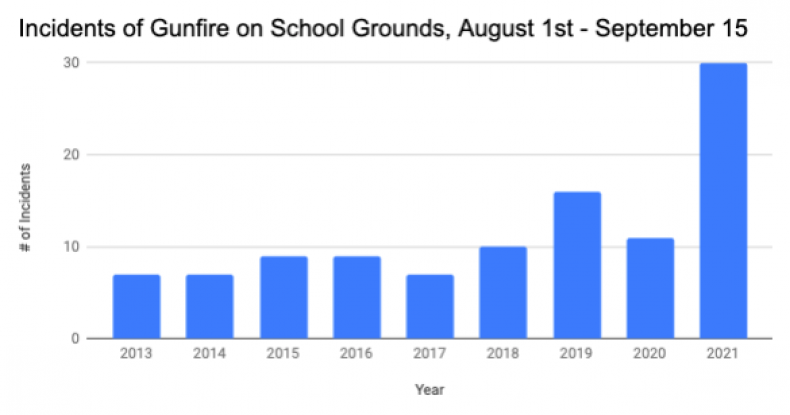Affects of School Shootings on Mental Health & How Parents can Help
School shootings have somehow become a much more common thing in the USA than I think anyone had thought they would have. By March of 2021, there had already been 31 school shootings within the US, with one occurring very recently, on Nov 30th, at Oxford Mich. high school. With these horrible events seemingly becoming more common, it is wondered by many how these events may affect students, even if they have not experienced such an event. There have been speculations that perhaps the pandemic had an affect on the increase in shootings as of this year, as the amount of them was much higher than many years before, as seen below.

School is a place for students to learn, therefore they should not be more worried about someone randomly coming to their school & causing such a horrible event. Are these students suddenly hyperaware of other students around them? Left in wondering if their peer may be an offender next?
Again, students should not have to worry about these types of things, and although I am personally not a parent, there are a handful of things that parents, relatives, teachers, etc., can do that may help towards making students feel safer.
As one can imagine, mass shootings are a traumatic event that can possibly trigger PTSD (Post Traumatic Stress Disorder). Multiple studies have actually come to show that children are even more vulnerable, and this childhood trauma could have a massive impact on their developing selves, from psychological worldview to physiological systems that handle their stress as well as anxiety. Naturally as well, the overall threat of mass shootings has an impact on mental health as well. It is common for children/students that are exposed to such an event that they will have;
- Increased anxiety
- Nightmares
- Difficulty sleeping
- Resistance to school
- Trust issues
- Uneasiness
- Depression
- Fear
- A possible decline in academic performances
- Grief
- Loss
- Change in eating habits/appetite
- Guilt
- Increase of anger
- Loss of sense of security and safety
and so forth.
These types of symptoms may end up resulting in Acute Stress Disorder, PTSD, or even delayed PTSD.
It is important for support groups around a person (friends, family, etc.) to attempt to provide help, so that they can recover successfully & perhaps hopefully decrease the psychophysiological consequences on ones mental health and stability. After traumatic events, such as a shooting, keeping an eye on the child & their emotions & behaviors can help detect any changes. Students, no matter the age, should also feel comfortable talking to schools, whether it be professors, teachers, principals, or even talking to their parents back at home.
Of course, with helping those affected, also comes attempting to fix the overall issue at hand, which is the amount of school shootings in general. This will surely bring in the long discussed debate of gun reform/stricter gun control laws. Which, realistically, between the combined forces of background checks and psychosocial evaluations, it could be possible to reduce future shootings in schools, as long as executed properly.
The impact of mass school shootings on Mental Health. (n.d.). Retrieved December 14, 2021, from https://www.psycom.net/mental-health-wellbeing/school-shooting-survivor-mental-health.
Education Week. (2021, December 9). School shootings this year: How many and where. Education Week. Retrieved December 14, 2021, from https://www.edweek.org/leadership/school-shootings-this-year-how-many-and-where/2021/03.
Katherine Fung On 10/5/21 at 10:30 AM EDT, Gillespie, N., & Rubin, D. (2021, October 23). School shootings nearly double as students return from Remote Learning. Newsweek. Retrieved December 14, 2021, from https://www.newsweek.com/school-shootings-nearly-double-students-return-remote-learning-1634858.